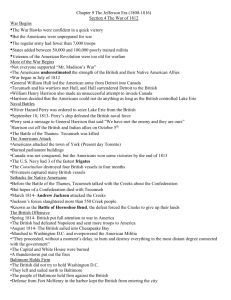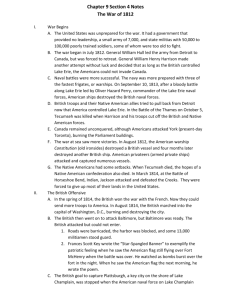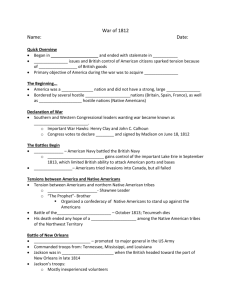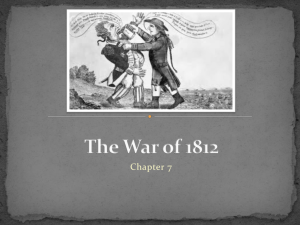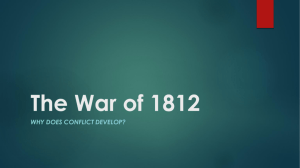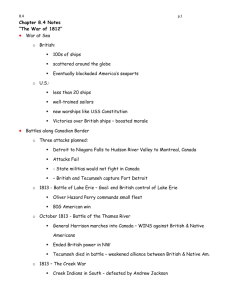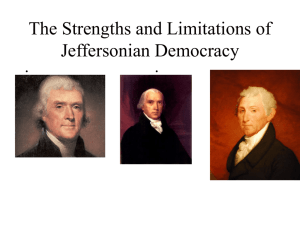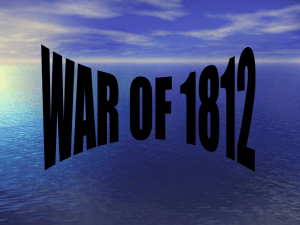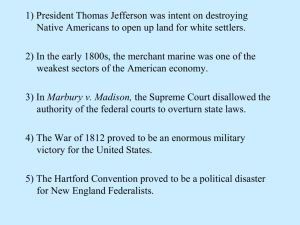File
advertisement
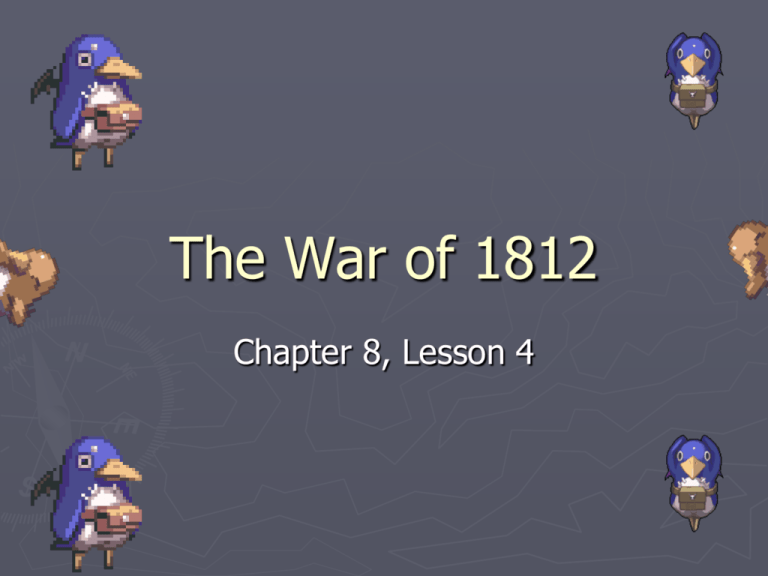
The War of 1812 Chapter 8, Lesson 4 ► Though War Begins the War Hawks bragged that they did would win the war, they actually were not as prepared as they thought. The regular army was less than 7,000 troops. The states had between 50,000 and 1000,000 soldier but were poorly trained. Many states opposed Madison’s war Military commanders, veterans of the American Revolutionary War were too old to fight. Washington provided no leadership Americans underestimated the strength of the British and Natives. ► The War Begins War begins in July 1812 when William hull led the American army from Detroit into Canada. Hull is met by Tecumseh and his Warriors and fearing a massacre by the Native Americans surrenders Detroit to a small British force in August. Another attempt by General William Harrison was unsuccessful as well. Harrison decides that Americans could make no headway in Canada as long as the British controlled Lake Eerie. ► Oliver Naval Battles Hazard Perry (Commander of the Lake Eerie naval forces) received orders to assemble a fleet and seize the lake from the British. His headquarters in Put-in-bay, Ohio, allowed him to watch the movements of the enemy ships. Fighting breaks out on September 10, 1813, when the British sailed out to face the Americans where Perry was successful at defeating the British navy in a bloody battle. He informs Harrison of the victory at Lake Eerie. ► With Lake Eerie belonging to the Americans, the British and their Native allies had to pull back from Detroit. Harrison cuts them off and face off in the Battle of Thames (October 5, 1813) where Tecumseh was killed. ► The Americans also attacked the town of York (present-day Toronto, Canada) and burned down the parliamentary building. Naval Battles ► ► Canada remained unconquered, but by the end of 1813 the Americans won some victories on land and sea. The size of the navy had been reduced by Republicans to lower the national debt. Still it had three of the fastest frigates (warships) afloat. Americans celebrated when the Constitution (one of the frigates) took down two British vessels (The Guerrière in August 1812, and the Java for months later) After viewing a shot bounce of the hull of the Constitution a sailor nicknamed it “Old Ironsides.” Privateers staged amazing attacks on British ships and captured many vessels. These victories were more important for morale than their strategic value. Setbacks for Native Americans ► With the death of Tecumseh, hope for a Native American confederation also died. In the two years before his death, he had been working with the Creeks in the Mississippi. ► Andrew Jackson (March 1814) – A lanky Tennessee planter attacked the Creeks in the Battle of Horseshoe Bend. His force slaughtered more than 550 of the Creek People forcing them to give up most of their land to the U.S. The British Offensive ► ► The British fortunes improved in the spring of 1814. They had been fighting a war with Napoleon and had won. They could now focus their attention and forces to America. Attack on Washington D.C. ► In August 1814, the British sailed into Chesapeake Bay heading for Washington D.C, where they overpowered the American militia and then marched into the city. They burned down most of the Capitol including the President’s Mansion. Thankfully, a violent thunderstorm puts out most of the fire before it could do more damage and this day (August 24) was considered a low point for the Americans. Baltimore Holds Firm ► The British did not try to hold Washington, and instead move onto Baltimore. Baltimore was more than ready with barricaded roads, a blocked harbor, 13,000 militiamen, and ferocious bombardment from Fort McHenry. During the night of September 13-14, Francis Scott Key saw the bombs burst over the fort and “by the dawn’s early light” the flag was still flying, and prompts him to write a poem known as “The Star-Spangled Banner” which later became the National Anthem. Defeat at Plattsburgh ► Meanwhile up North, General Sir George Prevost led more than 10,000 British troops into New York State from Canada. The first goal was to capture Plattsburgh, a key city on the shore of Lake Champlain. This stopped when an American naval force on Lake Champlain defeated the British fleet in 1814. The Americans could use this control of the lake to bombard them and land troops behind them but before they could they retreat to Canada. ► After the Battle of Lake Champlain, the British once again decide the war in North America was too costly and unnecessary and fighting the U.S. would gain little and was not worth the effort. The War Ends ► The Treaty of Ghent (December 1814) – American and British representatives sign a peace agreement outlining. It did not change any existing borders, discuss impressment, or neutral rights. ► The Battle of New Orleans (January 8, 1815) - Before the war’s end, one final and ferocious battle at New Orleans. In December 1814, British troops moved towards New Orleans. Hiding behind earthen fortifications was an American army led by Andrew Jackson. On January 8, 1815, the British troops advanced but were no match for Jackson’s troops. Hundred of British soldiers were killed. Jackson’s victory made him a hero, and his fame would help him win the presidency in 1828. American Nationalism ► ► New England Federalists opposed “Mr. Madison’s War” from the beginning. Hartford Convention – Unhappy, many of those Federalists gathered in Connecticut. A few favored secession, many wanted to remain within the Union. To protect their interest they draw p a list of proposed amendments to the Constitution. ► After the convention ends, words comes in of Jackson’s victory, followed by news of the peace treaty. This made the Federalists grievances seem unpatriotic, making them lose face with the public. Many American felt proud of the accomplishments of the War of 1812. ► The young nation gained the respect of many other nations in the world. American Nationalism ► The War Hawks, though Republican, carried out the philosophy of a strong central government of the Federalists. Federalists Party was weakened significantly. The War Hawks favored trade, western expansion, the energetic development of the economy, and a strong army and navy.
